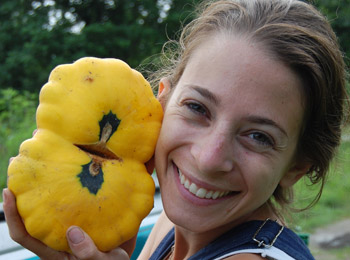Risa Alyson Cooper, director of Shoresh Jewish Environmental Programs, welcomes me to the organization’s Kavanah Garden, with her trademark smile.
The organic, educational garden near the Lebovic Jewish Community Campus in Vaughan, Ont., was featured in the 2011-2012 Slingshot, A Resource Guide to Jewish Innovation, an annual compilation of the 50 most inspiring and innovative projects and programs in the North American Jewish community. It was the only Canadian project listed.
CJN: Is it really possible to mention agriculture and Judaism in the same breath?
Cooper: Absolutely. Judaism has an incredibly rich agricultural tradition. Our ancestors were farmers, and many of the Jewish holidays reflect this deep connection with the land and its seasons. For example, Pesach, Shavuot and Sukkot are all harvest festivals celebrating the earth’s abundance. They sustained our ancestors and their communities. As well, many of Judaism’s social justice ethics are agriculturally rooted. The law of pe’ah (leaving the edges of your fields untouched so that people in need can come and harvest for themselves) is a form of tzedakah that directly relates to agriculture.
CJN: Do you find that the Halachah’s agricultural rules are relevant today?
Cooper: The majority of the agricultural laws outlined in the Torah are only applicable to biblical Israel. [But] I believe the lessons inherent in these laws are incredibly relevant to our contemporary North American community. These laws demonstrate a strong tradition of a Jewish food justice – of ensuring that everyone in our community has access to healthy and nourishing food. It is incredibly important that we remember that food justice is a Jewish ethic, and that we have a responsibility to ensure equal and fair access to food and life resources in our community.
We start by taking Jewish holidays, rituals and prayers and thinking of how we can use the garden as a setting to teach about these parts of our tradition in a way that is hands-on and meaningful.
CJN: What kind of programs do you run?
Cooper: Shoresh runs a number of different programs. At Kavanah Garden, we run field trips for schools, synagogues and camps. We also host a weekly free family drop-in program [beginning in June] and the Kavanah Kids summer program.
We host an organic gardening workshop for adults and offer volunteer opportunities for bar mitzvah students. As well, we host a weekly Community Supported Agriculture (CSA) program in partnership with a young Jewish farmer, where members receive weekly shares of fresh, local, organic produce.
We also host gardening and environmental workshops across the GTA and seniors programs at Baycrest. We’re currently developing community events for Shoresh’s Bela Farm, our new 115-acre farm, just an hour outside of Toronto.
CJN: Can you draw a profile of your volunteers? What are your other resources?
Cooper: Our volunteers are a diverse group from high school students to seniors, master gardeners to folks who have just planted their first tomato. Our funding comes from grants, individual donors and fee-for-service programs such as our school field trips and CSA memberships.
CJN: What do you grow and what do you do with the harvest?
Cooper: We grow over 100 varieties of organic vegetables, herbs and native wildflowers. Each year, we harvest more than 500 pounds of fresh, organic produce, which is donated to Ve’ahavta. They prepare the vegetables into delicious and nourishing soups and stews for community members in need.
CJN: What is your vision for the future?
Cooper: This is our last year at our current location. Next year we will relocate the garden to a permanent location on UJA of Greater Toronto’s Lebovic Campus. The UJA has supported us from the beginning by giving us access to land and helping us develop our young organization. Our vision is to grow, not only our harvest, but our community of friends who see the garden as an integral feature of Vaughan’s Jewish landscape.
For more information on Shoresh programs, visit www.shoresh.ca.
